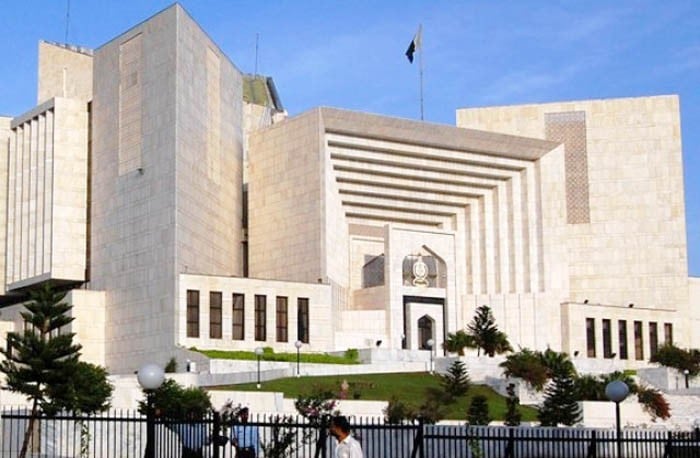
Although the parties involved in the Panama case have accepted the self-opted role of the Supreme Court, this ‘exercise of jurisdiction’ will remain a question of legal debate in future

Courtroom number one of the Supreme Court of Pakistan has stayed packed in the last week with media, politician, lawyers and common people from all walks of life. All of them are curiously awaiting the replies of Prime Minister Nawaz Sharif’s children -- their statement about owning luxurious flats in London and maintaining off-shore accounts as exposed in Panama papers some eight months ago.
However, the sudden intervention of the five member bench of the Supreme Court (SC) in this matter on November 1 has caused concerns among the legal and political circles. They are critical of the top court, which is primarily an appellate forum, for taking up what they call a high profile ‘political’ matter around allegations of corruption.
The SC intervened at a time when Pakistan Tehreek-e-Insaf (PTI), a main opposition party headed by Imran Khan, had announced the lockdown of the capital on November 2 -- to compel the PM to present himself for accountability, a matter which they claimed Sharif had been practically delaying for the past seven months.
There have been three hearings of the matter so far, with the fourth scheduled for November 15 when all concerned parties (petitioner and alleged respondents) have been given a deadline to submit all documents and evidences for further examination.
Asma Jahangir, former president of Supreme Court Bar Association (SCBA) and a prominent human rights defender of the country, is concerned and says, "This was a political matter and the SC lacks the mandate to form any commission or to adopt the role of investigator".
"The SC should direct the investigating agencies to perform their role rather than making commission or setting such precedents," she says. "There have been many other names in the Panama Papers including some judges and if at all, the SC should have paid attention to those too." She objects to the formulation of Terms of Reference (ToRs) by the court itself.
The Supreme Court has interpreted Article 184 (3) of the constitution that qualifies it to admit the Panama petition for hearing or suggesting the setting up of a commission to look into it in the coming days.
Article 184 (3) of the constitution reads: "Without prejudice to the provisions of Article 199, the Supreme Court shall, if it considers that a question of public importance with reference to the enforcement of any of the Fundamental Rights conferred by Chapter I of Part II is involved, have the power to make an order of the nature mentioned in the said Article."
The court has also announced to take up this case under Article 187 of the constitution that reads: "Supreme Court shall have power to issue such directions, orders or decrees as may be necessary for doing complete justice in any case or matter pending before it, including an order for the purpose of securing the attendance of any person or the discovery or production of any document."
The Chief Justice in his repeated remarks in these three hearings stated that the court is meant for adjudication rather than investigation. But they [the SC] were forced to invoke these articles of the constitution and assume this role when investigation agencies and institutions failed to take action on this matter.
Zafarullah Khan, special assistant to PM Sharif on law and human rights affairs, says though the parties involved in the case have no objection on this self-opted role of the SC, this exercise of jurisdiction, which is also pointed out by the attorney general, will remain a question of legal debate in future. "When this jurisdiction is exercised by the highest appellate forum, the SC, and when there is no appeal against this decision, which is also highly political, the debate will continue," says Khan.
Pakistan Bar Council, as well the legal fraternity at large, is also divided on this matter. One speculation is that the military establishment wants to put an elected democratic regime under its thumb.
So far, the court appears serious and confident. Despite all the legal and political controversies, the court has given a deadline to all parties to submit their relevant documents on these allegations and claims. The court is expected to examine these documents carefully and examine all sides’ views and pieces of evidences.
It remains to be seen if PM Sharif’s children are able to satisfy the court by proving valid and lawful holding of these companies and properties or the petitioners manage to prove their claims. As of now, the government says Panama leaks have no credibility with reference to the names of PM’s children. In other countries like the United Kingdom, Iceland, and Argentine on the other hand, politicians have come forth and explained their position to the last detail or even resigned.
The broader question is the accountability of the ruling elite which controls powers and institutions, especially, in developing countries where these accountability departments are not fully independent and the jurisdiction of courts and lacunas in the law are also debatable.
Umar Cheema, the Islamabad-based investigative journalist who was a part of the International Consortium of Investigative Journalists (ICIJ) team responsible for unearthing these Panama documents, says: "The PM’s children have not denied the ownership of the exposed companies. Besides, the issue has not only highlighted matters of alleged corruption but also spotlighted the institutional failure in dealing with this menace.
"If history is any guide, this [issue] too will go unaccounted for. The challenge is that no matter what guidelines are given by the court, the whole process will be executed by the institutions that need reforms."